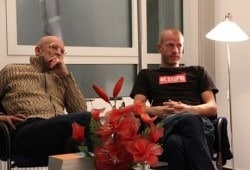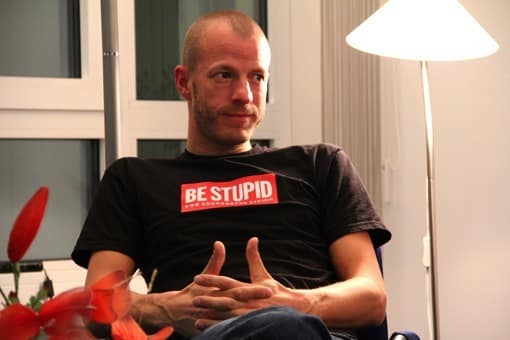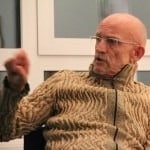"Does the gay scene make you happy?" This was the question discussed on 6 October in the Salon Wilhelmstraße of Deutsche AIDS-Hilfe. Philip Eicker has followed the passionate discussion for ICH WEISS WAS ICH TU

Even the initial question is controversial: a scene cannot make you happy, some guests argue, everyone is responsible for their own happiness. Of course, the organisers - Deutsche AIDS-Hilfe and ICH WEISS WAS ICH TU - also know that it is asking too much of the gay world to demand an entire happy life. The question should not be answered unequivocally, but should raise further questions: Is the scene good for gay men? And does it sometimes do harm, for example by confronting those who seek happiness there with body worship and youth mania?
A young man searches for true love, his gay identity, a home - and ends up in the nightlife of the big city, where it's all about sex and where superficiality and self-hatred reign supreme. This story was told in the 1971 film "It's not the homosexual who is perverted, but the situation in which he lives". Is this pessimistic diagnosis still valid 40 years later? This provocative story kicks off the discussion. Also present: sexologist Martin Dannecker, one of the leading minds behind the film at the time.
But first, journalist Dirk Ludigs (formerly of DU&ICH, FRONT) has the floor. He emphasises that gay men generally have a difficult life story behind them: "The scene is a place where people with problems cluster." For a self-confident person, this is manageable, but not for someone "who doesn't have much else to be proud of". And: "The tighter I close the lid on the rest of the world, the greater the risk that I will be unhappy." In the most extreme cases, this can lead to depression or drug abuse.
"Can the gay scene corrupt a young person who comes from the provinces to the big city?" provokes presenter Holger Wicht.
Martin Dannecker opposes this. He dislikes the undertones of the discussion, in which gay life is portrayed as pathological from his point of view. His judgement is friendlier than it was 40 years ago: The scene is far more than nightlife, he says, it extends to the gay dog breeders' club. It helps with the development of an individual gay lifestyle. "We are not a blank sheet of paper, we come into the scene with relatively stable patterns [psychological patterns, editor's note]," Dannecker emphasises. Their offers of identification can be accepted, rejected or modified.
"In large cities in particular, there are not the It's not just one scene, but many different ones," says Crispin Prill, assistant to the managing director, and he and the managing director put a lot of thought into creating a friendly atmosphere before the shops opened. Communication is important to Prill, which is why Grosse Freiheit has a brighter guest room with a jukebox and pinball machine as well as a "quiet guest room", which is deliberately not called a darkroom.
But do we still need gay bars at all? An audience member urges the panellists not to neglect the Internet during the discussion. Immediately, the room comes to life. "Does blue make you happy?" someone shouts, alluding to Gayromeo. Dirk Ludigs is enthusiastic: "The internet offers excellent opportunities to organise sex - without having to stand in a club until two in the morning and get drunk." In the time he has saved, he prefers to meet up with friends for dinner.
Stephan Roth, role model at ICH WEISS WAS ICH TU, has a completely different view: "I've often read the joke about 11 88 0 on Gayromeo recently: 11 hours in front of the computer, 88 chats and zero results. That sounds unfortunate to me!"
However, it remains undisputed that many gay men allow themselves to be stressed by scene ideals. They don't feel beautiful, slim or young enough. "Is the scene still a safe space where everyone can be who they are?" asked Dirk Sander, gay counsellor at Deutsche AIDS-Hilfe. "We often create new norms there that put us under pressure." But don't heterosexual women also suffer from the slimming mania? Martin Dannecker: "Our whole society doesn't make us happy - how can the gay scene make us happy?"
As contrasting as the perspectives are, everyone agrees on one thing: a lot of frustration with the scene stems from the high expectations of its users. "Anyone who goes to a cruising pub with a secret desire to get married will be sorely disappointed," states one listener. Dirk Ludigs emphasises that the scene is first and foremost a place to find sex partners: "In straight circles, nobody would think of discussing whether the Reeperbahn makes you happy. The big problem for gays is that the scene is also the most important marriage market."
Stephan Roth is too negative. In the final round, he literally explodes: "Does the gay scene make you happy? Yes! The gay scene makes you happy!" He has a lot of fun there and meets mostly happy people. His conclusion: "The scene is always what you make of it."
And then suddenly everyone agrees with this statement.
Video excerpts from the discussion
What do you think about the scene? Write a comment to keep the discussion going!
More about Stephan on iwwit.de: "Positive? I won't let it get me down!"
















